- Home
- T. S. Eliot
The Family Reunion Page 6
The Family Reunion Read online
Page 6
Says he doesn’t know this part of the country
And stopped to take his bearings. We’ve got him at the Arms—
Mr. John, I mean. By a bit of luck
Dr. Owen was there, and looked him over;
Says there’s nothing wrong but some nasty cuts
And a bad concussion; says he’ll come round
In the morning, most likely, but he mustn’t be moved.
But Dr. Owen was anxious that you should have a look at him.
WARBURTON
Quite right, quite right. I'll go and have a look at him.
We must explain to your mother . . .
AMY’S VOICE
Harry! Harry!
Who’s there with you? Is it Arthur or John?
[Enter AMY, followed severally by VIOLET, IVY, GERALD, AGATHA, and CHARLES]
Winchell! what are you here for?
WINCHELL
I’m sorry, my Lady, but I’ve just told the doctor,
It’s really nothing but a minor accident.
WARBURTON
It’s John has had the accident, Lady Monchensey;
And Winchell tells me Dr. Owen has seen him
And says it’s nothing but a slight concussion,
But he mustn’t be moved tonight. I’d trust Owen
On a matter like this. You can trust Owen.
We'll bring him up tomorrow; and a few days’ rest,
I’ve no doubt, will be all that he needs.
AMY
Accident? What sort of an accident?
WINCHELL
Coming along in the fog, my Lady,
And he must have been in rather a hurry.
There was a lorry drawn up where it shouldn’t be,
Outside of the village, on the West Road.
AMY
Where is he?
WINCHELL
At the Arms, my Lady;
Of course, he hasn’t come round yet.
Dr. Owen was there, by a bit of luck.
GERALD
I’ll go down and see him, Amy, and come back and report to you.
AMY
I must see for myself. Order the car at once.
WARBURTON
I forbid it, Lady Monchensey.
As your doctor, I forbid you to leave the house tonight.
There is nothing you could do, and out in this weather
At this time of night, I would not answer for the consequences.
I am going myself. I will come back and report to you.
AMY
I must see for myself. I do not believe you.
CHARLES
Much better leave it to Warburton, Amy.
Extremely fortunate for us that he’s here.
We must put ourselves under Warburton's orders.
WARBURTON
I repeat, Lady Monchensey, that you must not go out.
If you do, I must decline to continue to treat you.
You are only delaying me. I shall return at once.
AMY
Well, I suppose you are right. But can I trust you?
WARBURTON
You have trusted me a good many years. Lady Monchensey;
This is not the time to begin to doubt me.
Come, Winchell. We can put your bicycle
On the back of my car.
[Exeunt WARBURTON and WINCHELL.]
VIOLET
Well, Harry,
I think that you might have had something to say.
Aren’t you sorry for your brother? Aren’t you aware
Of what is going on? and what it means to your mother?
HARRY
Oh, of course I’m sorry. But from what Winchell says
I don’t think the matter can be very serious.
A minor trouble like a concussion
Cannot make very much difference to John.
A brief vacation from the kind of consciousness
That John enjoys, can’t make very much difference
To him or to anyone else. If he was ever really conscious,
I should be glad for him to have a breathing spell:
But John’s ordinary day isn’t much more than breathing.
IVY
Really, Harry! how can you be so callous?
I always thought you were so fond of John.
VIOLET
And if you don’t care what happens to John,
You might show some consideration to your mother.
AMY
I do not know very much:
And as I get older, I am coming to think
How little I have ever known.
But I think your remarks are much more inappropriate
Than Harry’s.
HARRY
It’s only when they see nothing
That people can always show the suitable emotions—
And so far as they feel at all, their emotions are suitable.
They don’t understand what it is to be awake,
To be living on several planes at once
Though one cannot speak with several voices at once.
I have all of the rightminded feeling about John
That you consider appropriate. Only, that’s not the language
That I choose to be talking. I will not talk yours.
AMY
You looked like your father
When you said that.
HARRY
I think, mother,
I shall make you lie down. You must be very tired.
[Exeunt HARRY and AMY.]
VIOLET
I really do not understand Harry’s behaviour.
AGATHA
I think it is as well to leave Harry to establish
If he can, some communication with his mother.
VIOLET
I do not seem to be very popular tonight.
CHARLES
Well, there’s no sort of use in any of us going—
On a night like this—it’s a good three miles;
There’s nothing we could do that Warburton can’t.
If he’s worse than Winchell said, then he’ll let us know at once.
GERALD
I am really more afraid of the shock for Amy;
But I think that Warburton understands that.
IVY
You are quite right, Gerald, the one thing that matters
Is not to let her see that anyone is worried.
We must carry on as if nothing had happened,
And have the cake and presents.
GERALD
But I’m worried about Arthur:
He’s much more apt than John to get into trouble.
CHARLES
Oh, but Arthur’s a brilliant driver.
After all the experience he’s had at Brooklands,
He’s not likely to get into trouble.
GERALD
A brilliant driver, but more reckless.
IVY
Yet I remember, when they were boys,
Arthur was always the more adventurous
But John was the one that had the accidents,
Somehow, just because he was the slow one.
He was always the one to fall off the pony,
Or out of a tree—and always on his head.
VIOLET
But a year ago, Arthur took me out in his car,
And I told him I would never go out with him again.
Not that I wanted to go with him at all—
Though of course he meant well—but 1 think an open car
Is so undignified: you’re blown about so,
And you feel so conspicuous, lolling back
And so near the street, and everyone staring;
And the pace he went at was simply terrifying.
I said I would rather walk: and I did.
GERALD
Walk? where to?
VIOLET
He started out to take me to Cheltenham;
But I stopped him somewhere in Chiswick, I think.
Anyway, the district was unfamiliar
And I had the greatest trouble in getting home.
I am sure he meant well, But I do think he is reckless.
GERALD
I wonder how much Amy knows about Arthur?
CHARLES
More than she cares to mention, I imagine.
[Enter HARRY.]
HARRY
Mother is asleep, I think: it’s strange how the old
Can drop off to sleep in the middle of calamity
Like children, or like hardened campaigners. She looked
Very much as she must have looked when she was a child.
You’ve been holding a meeting—the usual family inquest
On the characters of all the junior members?
Or engaged in predicting the minor event,
Engaged in foreseeing the minor disaster?
You go on trying to think of each thing separately,
Making small things important, so that everything
May be unimportant, a slight deviation
From some imaginary course that life ought to take,
That you call normal. What you call the normal
Is merely the unreal and the unimportant.
I was like that in a way, so long as I could think
Even of my own life as an isolated ruin,
A casual bit of waste in an orderly universe.
But it begins to seem just part of some huge disaster,
Some monstrous mistake and aberration
Of all men, of the world, which I cannot put in order.
If you only knew the years that I have had to live
Since I came home, a few hours ago, to Wishwood.
VIOLET
I will make no observation on what you say, Harry;
My comments are not always welcome in this family.
[Enter DENMAN.]
DENMAN
Excuse me, Miss Ivy. There’s a trunk call for you.
IVY
A trunk call? for me? why, who can want me?
DENMAN
He wouldn’t give his name, Miss; but it’s Mr. Arthur.
IVY
Arthur! Oh, dear, I’m afraid he's had an accident.
[Exeunt IVY and DENMAN.]
VIOLET
When it’s Ivy that he’s asking for, I expect the worst.
AGATHA
Whatever you have learned, Harry, you must remember
That there is always more: we cannot rest in being
The impatient spectators of malice or stupidity.
We must try to penetrate the other private worlds
Of make-believe and fear. To rest in our own suffering
Is evasion of suffering. We must learn to suffer more.
VIOLET
Agatha’s remarks are invariably pointed.
HARRY
Do you think that I believe what I said just now?
That was only what I should like to believe.
I was talking in abstractions: and you answered in abstractions.
I have a private puzzle. Were they simply outside,
I might escape somewhere, perhaps. Were they simply inside
I could cheat them perhaps with the aid of Dr. Warburton—
Or any other doctor, who would be another Warburton,
If you decided to set another doctor on me.
But this is too real for your words to alter.
Oh, there must be another way of talking
That would get us somewhere. You don’t understand me.
You can’t understand me. It’s not being alone
That is the horror, to be alone with the horror.
What matters is the filthiness. I can clean my skin,
Purify my life, void my mind,
But always the filthiness, that lies a little deeper . . .
[Enter IVY.]
IVY
Where is there an evening paper?
GERALD
Why, what’s the matter?
IVY
Somebody, look for Arthur in the evening paper.
That was Arthur, ringing up from London:
The connection was so bad, I could hardly hear him,
And his voice was very queer. It seems that Arthur too
Has had an accident. I don’t think he’s hurt,
But he says that he hasn’t got the use of his car,
And he missed the last train, so he’s coming up tomorrow;
And he said there was something about it in the paper,
But it’s all a mistake. And not to tell his mother.
VIOLET
What’s the use of asking for an evening paper?
You know as well as I do, at this distance from London
Nobody’s likely to have this evening’s paper.
CHARLES
Stop, I think I bought a lunch edition
Before I left St. Pancras. If I did, it’s in my overcoat.
I’ll see if it’s there. There might be something in that.
[Exit.]
GERALD
Well, I said that Arthur was every bit as likely
To have an accident as John. And it wasn’t John’s fault,
I don’t believe. John is unlucky,
But Arthur is definitely reckless.
VIOLET
I think these racing cars ought to be prohibited.
[Re-enter CHARLES, with a newspaper.]
CHARLES
Yes, there is a paragraph . . . I’m glad to say
It’s not very conspicuous . . .
GERALD
There’ll have been more in the later editions.
You’d better read it to us.
CHARLES [reads]
‘Peer's Brother in Motor Smash’
‘The Hon. Arthur Gerald Charles Piper, younger brother of Lord Monchensey, who ran into and demolished a roundsman’s cart in Ebury Street early on the morning of January 1st, was fined £50 and costs today, and forbidden to drive a car for the next twelve months.
While trying to extricate his car from the collision, Mr. Piper reversed into a shop-window. When challenged, Mr. Piper said: “I thought it was all open country about here”—’
GERALD
Where?
CHARLES
In Ebury Street. ‘The police stated that at the time of the accident Mr. Piper was being pursued by a patrol, and was travelling at the rate of 66 miles an hour. When asked why he did not stop when signalled by the police car, he said: “I thought you were having a game with me.”’
GERALD
This is what the Communists make capital out of.
CHARLES
There’s a little more. ‘The Piper family . . .’ no, we needn’t read that.
VIOLET
This is just what I expected. But if Agatha
Is going to moralise about it, I shall scream.
GERALD
It’s going to be awkward, explaining this to Amy.
IVY
Poor Arthur! I’m sure that you’re being much too hard on him.
CHARLES
In my time, these affairs were kept out of the papers;
But nowadays, there’s no such thing as privacy.
CHORUS
In an old house there is always listening, and more is heard than is spoken.
And what is spoken remains in the room, waiting for the future to hear it.
And whatever happens began in the past, and presses hard on the future.
The agony in the curtained bedroom, whether of birth or of dying,
Gathers in to itself all the voices of the past, and projects them into the future.
The treble voices on the lawn
The mowing of hay in summer
The dogs and the old pony
The stumble and the wail of little pain
The chopping of wood in autumn
And the singing in the kitchen
And the steps at night in the corridor
The
moment of sudden loathing
And the season of stifled sorrow
The whisper, the transparent deception
The keeping up of appearances
The making the best of a bad job
All twined and tangled together, all are recorded.
There is no avoiding these things
And we know nothing of exorcism
And whether in Argos or England
There are certain inflexible laws
Unalterable, in the nature of music.
There is nothing at all to be done about it,
There is nothing to do about anything,
And now it is nearly time for the news
We must listen to the weather report
And the international catastrophes.
[Exeunt CHORUS.]
Scene II
HARRY, AGATHA
HARRY
John will recover, be what he always was;

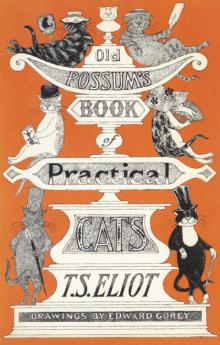 Old Possum's Book of Practical Cats
Old Possum's Book of Practical Cats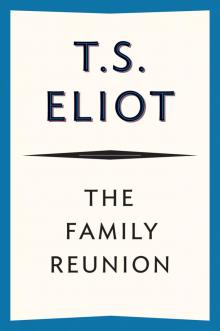 The Family Reunion
The Family Reunion T. S. Eliot the Poems, Volume 2
T. S. Eliot the Poems, Volume 2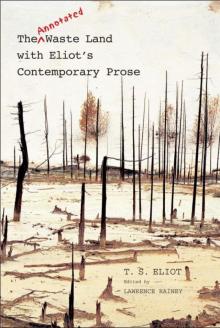 The Waste Land
The Waste Land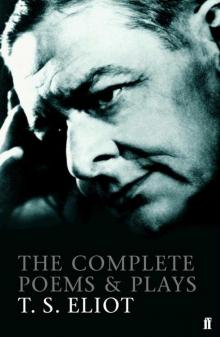 The Complete Poems and Plays, 1909-1950
The Complete Poems and Plays, 1909-1950 Letters of T.S. Eliot: 1898-1922
Letters of T.S. Eliot: 1898-1922 The Letters of T. S. Eliot, Volume 1: 1898-1922
The Letters of T. S. Eliot, Volume 1: 1898-1922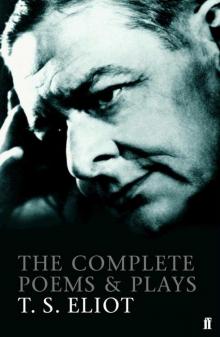 Complete Poems and Plays
Complete Poems and Plays